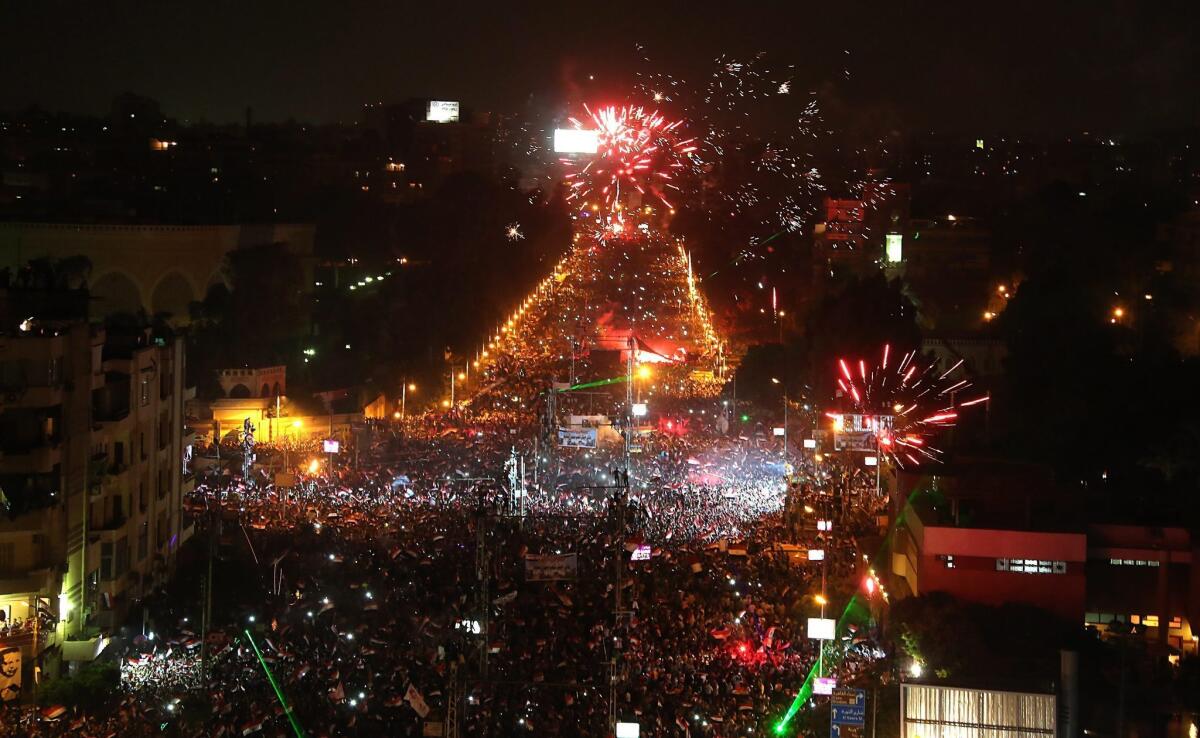Lessons for Egypt, and the U.S., in Morsi’s ouster

After days of intense protesting and mounting opposition, Egypt’s military ousted the nation’s democratically elected leader, President Mohamed Morsi, who criticized the move as a “complete military coup.” In doing so, the military also scrapped the constitution and appointed the head of the Supreme Constitutional Court as acting president. The move came in response to Egyptians who, for days, have been calling for Morsi’s resignation.
Robert Satloff, executive director of the Washington Institute for Near East Policy, writes that Morsi’s ouster affords President Obama the rare opportunity to avoid making the same mistake twice. He argues that Obama’s mistake was deference to Egypt’s military when President Hosni Mubarak was ousted in February 2011.
No one should revel in the deposition of an elected leader by a country’s military, but this is not a coup in the traditional sense and does not merit a suspension of U.S. assistance our law prescribes. Indeed, the army almost surely prevented a bloodbath that would have scarred Egypt for decades. Inaction, not intervention, would have been criminal.
But with the army back in the saddle, it would also be criminal for the administration to repeat the errors of the last episode of military rule, when everything was sacrificed on the altar of stability. Gen. Abdel Fatah al-Sissi, the new white knight, is no more a democrat than [Field Marshal Mohammad Hussein] Tantawi, though he may be more adept. Washington needs to be more adept, too. (Washington Post)
One question some have raised is why the protesters support the army. Human rights activist Dalia Ziada, executive director of the Ibn Khaldun Center for Development Studies in Cairo, answers this in an online column:
The people trust the military more than they trust any other institution in the country. This is partly because of the military’s historical legacy that has left it as the strongest in the region. Another important reason is that military officers, who are very much part of the fabric of the country, are very patriotic and loyal to no one but Egypt. Much of this is because the military has sustained a professionalism that has allowed it to be independent in making its own decisions. The interests of the military are not dependent on the interests of the regime or any supreme authority in Egypt. (CNN)
Michael Hirsh writes that “on the eve of July 4, secular Egyptian protesters have achieved something like their own Declaration of Independence against the threat of Islamist takeover,” discussing how the protest signals the failure of a fundamentalist state in Egypt:
The future of Egypt’s infant democracy is now utterly unclear, but there is some cause for hope. While the most radical Islamists will no doubt draw the wrong lessons from the turmoil in Egypt -- don’t participate in Western-style democratic elections at all -- the smarter and more numerous Islamist parties will, like many in the already fractious Muslim Brotherhood (which has seen many defectors), have no choice but to learn to compromise on their ultimate dreams of a fundamentalist state far more than they have already done. Already the radical Salafist Nour Party has hedged, cautiously siding with the protesters and calling for fast presidential elections in order to avoid “civil war.” (The Atlantic)
Some cited Morsi’s fall as evidence of how difficult it is to create a democracy in the Arab world. But Georgetown University law professor David Super suggests that Egyptians have “proved extraordinarily adept students of democracy”:
No democracy can long endure unless the electorate is proficient at ridding itself of self-serving politicians who betray the public trust. By turning on Morsi, and by extension, the Brotherhood, Egyptians are showing that they have learned that crucial lesson. The Brotherhood now will have to spend time in the political wilderness, learning the lessons of its fall much as overreaching parties the world over do. And if the military exceeds its popular mandate and seeks to reclaim power for itself, the Egyptian people will have an answer. (Los Angeles Times)
In a post for the New Republic, George Washington University’s Nathan Brown explains what the Muslim Brotherhood might regret. He points to decision-making and political strategy as two examples:
The organization first needs some time to think, and it is not yet clear how the disparate coalition that has destroyed the Morsi presidency will react to the Brotherhood’s continued role. In this respect, it would be wise for those who are now victorious in Egypt to remember that the issue is not only what the Brotherhood learns; the issue is also what Islamists are taught. (The New Republic)
The Nation’s Bob Dreyfuss provides a live commentary on the meaning of Morsi’s fall and the events in Egypt:
First, Egypt is not Algeria. When Algeria’s military overthrew an elected Islamist-fundamentalist regime in the early 1990s, a horrible civil war resulted. That won’t happen in Egypt, in part because the military has overwhelming popular support. And if the Muslim Brotherhood chooses a violent path now, it will be crushed. (The Nation)
ALSO:
Exaggerating the importance of affirmative action
How dangerous is the arsenic in our rice? FDA needs to let us know
‘The Lone Ranger’: Is Johnny Depp’s Tonto fair to Native Americans?
Twitter: @danielrothberg
More to Read
A cure for the common opinion
Get thought-provoking perspectives with our weekly newsletter.
You may occasionally receive promotional content from the Los Angeles Times.






